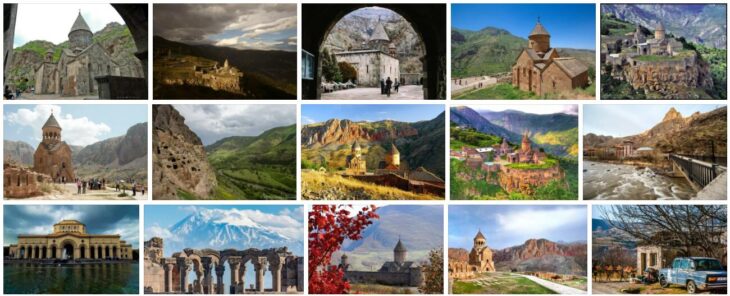Armenia is a country located in Asia with name that begins with letter A. Armenia lies at the transition between Asia Minor and Transcaucasia. The current state covers an area of 29,800 km² in the northeast of the Armenian Highlands and on the southern edge of the Lesser Caucasus. The land area of Armenia, 90% of which is over 1,000 meters above sea level, is about half the size of Austria. Armenia borders Georgia in the north, Azerbaijan in the east, Iran in the southeast, the Azerbaijani exclave Nakhichevan in the south and Turkey from southwest to west. The current population is around 3.3 million, of which around 1.4 million live in the greater area of the capital Yerevan (Yerevan). The majority of Armenians live in the diaspora: a total of around 10 million Armenians are distributed across the globe.
Armenia became the first Christian country in the world in the 4th century. 94% of the population still belong to the Armenian Apostolic Church.
From 1921 to 1991, Armenia was part of the USSR. With the collapse of the communist empire, the country declared itself an independent republic in 1991.
Entry
EU citizens only need a valid passport to enter Armenia, which must be valid for 6 months at the time of entry.
Climate
Armenia is located in the subtropics, but due to the fragmented, mostly mountainous landscapes as well as the extreme height differences in a small area – up to 3,000 m height difference within a radius of 100 km as the crow flies – there are very different local climatic conditions: Continental climate with dry, hot summers and short, cold winters prevail in the valleys and lowlands; It is generally cooler in the mountains, but the Caucasus shields cold spells from the north. In the southeast of the country – on the border with Iran – the climate is subtropical and very dry.
Food and drink
Armenian cuisine is based on beef and vegetables, which, thanks to the mineral-rich soils of the country, taste more intense than anywhere else. As in oriental cuisine, different spices, vegetables, fish and fruits are combined in Armenia to create unique taste experiences. They are very proud of the various fruits growing in the country, but especially of the apricots, which Alexander the Great is said to have brought into the country and which, according to the locals, are the best in the world.
However, one should be careful when consuming raw fruits and salads; Likewise, tap water should not be drunk or only in a boiled state.
Health and vaccinations
No vaccinations are required to stay in Armenia. However, medical care does not meet European standards. A personal pharmacy with your own medicines is therefore strongly recommended; it makes it easier to act in the event of illness.
Security
The usual security measures for tourists are recommended: Valuables should not be carried openly and only small amounts of money should be carried.
Cultural rules of conduct
The Armenians are an open, friendly people, where the family is very important and the elderly are very valued. Wear decent clothing when visiting the cathedral and other important religious sites.

